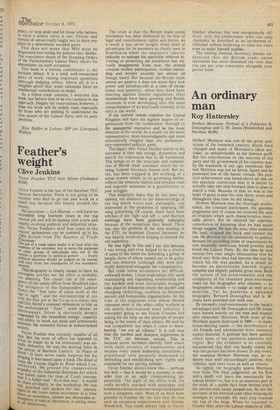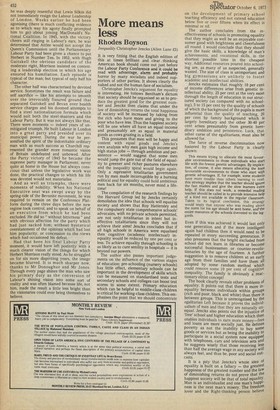An ordinary ,
man
Roy Hattersley
Herbert Morrison: Portrait of a Politician B. Donoughue and G. W. Jones (Weidenfeld and Nicolson £6.00) Herbert Morrison was one of the great politicians of the twentieth century. Styles have changed and many of Morrison's ideas are, today, as unfashionable as his famous quiff. But his contribution to the success of his party and the government of his country was, by the standards of any age, enormous. Herbert Morrison was not an heroic figure and he possessed few of the heroic virtues. His political achievement was based above all else on the absolute conviction that it is better to actually take one step forward than to plan to march a mile. Because of that he was at the heart of great events for over thirty years and throughout that time he did things.
Herbert Morrison was the thorough professional, the constant participant, the genuine pragmatist and of course he received the sort of criticism which such characteristics inevitably attract. But he enjoyed the supreme consolation of knowing that he had made things happen. He was the man, who endured
, the heat, stopped the buck and carried the can. He devoted his life exclusively to politics because (in ascending order of importance) he was incurably ambitious, hated poverty and loved the Labour Party. By the time he was twenty-five that single infatuation (for he loved very little else) had become the star by which his life was guided. As a result he became an emotionally limited, highly complex and slightly pathetic great man. Both the nature of his achievements and the complexity of his character pose enormous tasks for the biographer who chooses — as biographers should — to judge as well as to describe. Yet he deserves a splendid biography. Bernard Donoughue and G. W. Jones have provided him with one.
By necessity (and enormously to the book's advantage) both Mr Donoughue and Mr Jones have leaned heavily on the men and women who remember Morrison. With most of the Morrison papers destroyed in 1960 — to make house-moving easier — the recollections of old friends and adversaries were essential source material. A portrait has been painted which some of his uncritiCal admirers will regret. But the evidence is so carefully documented that they can hardly resent the way the picture has been drawn. In any event, the essential Herbert Morrison was an ordinary man with extraordinary abilities. And ordinary men have vices as well as virtues. So rightly the biography spares Morrison very little. The final judgement on his first wife's death will leave the emotionally fastidious breathloss; but it is an essential part of the story of a public face from behind which the private man rarely peeped out. So are the accounts of his frenzied (and often misjudged) attempt's to scramble the next step towards the top of the heap. When he returned to County Hall, after the Labour debacle of 1931, he was deeply resentful that Lewis Silkin did not immediately resign the Labour Leadership of London. Weeks earlier he had been agonising (there is much conflicting evidence as to which way his agony finally prompted him to go) about joining MacDonald's National Coalition. In 1945, with the victory cheers still ringing in Labour's ears, he was determined that Attlee would not accept the Queen's Commission until the Parliamentary Labour Party had been given a chance to put Herbert in Number Ten. In 1952, with Hugh Gaitskell the obvious candidate of the moderate right, Morrison insisted on contesting a leadership election in which his age ensured his humiliation. Each episode is typical of the man; but typical of only half his character.
The other half was characterised by devoted service. Sometimes the result was failure and self sacrifice — like his attempts to smooth over the irrevocably fissured ground that separated Gaitskell and Bevan over health service charges and his doomed attempts to find a steel nationalisation formula which would suit both the steel-masters and the Labour Party. But it was not always like that.
There were moments — indeed years of unmitigated triumph. He built Labour in London into a great party and presided over its municipal power. During the war he personified the spirit of the indomitable ordinary man with as much success as Churchill rep resented the grander more romantic vision of Britain undefeated and unbowed. After the Party victory of 1945 he became the supreme party manager in Parliament; never quite at home in the House but always cons cious that unless the legislative work was done, the practical changes to which his life was devoted would not materialise.
And as well as triumphs, there were moments of nobility. When his National Executive seat was swept away by the spring-tide of the Bevanite movement, he was required to remain on the Conference Plat form during the three days before the new regime took control, and to speak on behalf of an executive from which he had been excluded. He did so "without bitterness" and with obvious affection for the party which had just sacked him; without hysterical overstatement of the opinions which had lost him popularity, or concession to the views which had occasioned his defeat.
Had that been his final Labour Party moment, it would have left posterity with a much clearer vision of the things for which Herbert Morrison really stood. As he struggled on for six more dispiriting years, the image became blurred. It is much sharper now, thanks to Mr Donoughue and Mr Jones. Through every page shines the man who saw his primary duty as the conversion of Labour's shining vision into some sort of reality and was often blamed because life, not him, made the result a little less bright than the visionaries could ever bring themselves to believe.



































 Previous page
Previous page